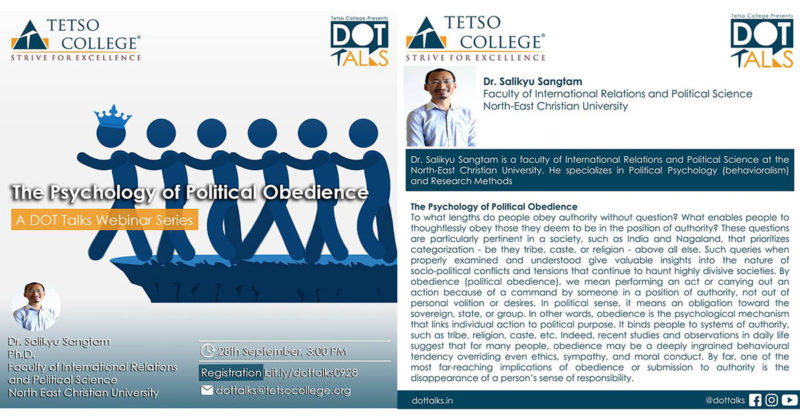Date: 28th September, 2020
Time: 3:00 PM
Registration: bit.ly/dottalks0928
To what lengths do people obey authority without question? What enables people to
thoughtlessly obey those they deem to be in the position of authority? These questions are
particularly pertinent in a society, such as India and Nagaland, that prioritizes
categorization—be they tribe, caste, or religion—above all else. Such queries when properly
examined and understood give valuable insights into the nature of socio-political conflicts
and tensions that continue to haunt highly divisive societies.
By obedience (political obedience), we mean performing an act or carrying out an action
because of a command by someone in a position of authority, not out of personal volition or
desires. In political sense, it means an obligation toward the sovereign, state, or group. In
other words, obedience is the psychological mechanism that links individual action to
political purpose. It binds people to systems of authority, such as tribe, religion, caste, etc.
Indeed, recent studies and observations in daily life suggest that for many people, obedience
may be a deeply ingrained behavioural tendency overriding even ethics, sympathy, and moral
conduct. By far, one of the most far-reaching implications of obedience or submission to
authority is the disappearance of a person’s sense of responsibility.
This is visibly evident especially when individual persons are immersed in a crowd.
Individuals in a mass crowd are especially prone to obedience, a phenomenon that is yet to be
properly grasped to appreciate the recurring tumultuous communal political events and other
political outcomes. Here, the crowd has come to play an essential role for tribal and
communal leaders and politicians to attain certain aims, as masses become slaves to the will
of their masters (i.e. tribal and communal leaders).
This phenomenon is better understood when we consider the innate human need to obey;
especially, the need to obey without questioning the authority we see as legitimate, which
further certifies our need to conform to existing norms, values, and beliefs that implicitly
sanctions and discourages anyone from going against the established groups’ dogmas. This is
particularly true as the primordial and instinctual pull of tribal or communal organization still
looms large in most of our lives, with many identifying and stereotyping both ourselves and
others based on categories, such as tribe, caste, or religion, to which we adhere or belong.
BRIEF BIOGRAPHY OF THE SPEAKER
Salikyu, Ph.D.
Faculty of International Relations and Political Science
North East Christian University
Salikyu is a faculty of International Relations and Political Science at the North East
Christian University. He specializes in political psychology (behavioralism) and research
methods.

